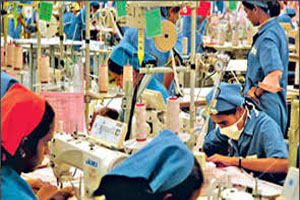
Hong Kong finds Sri Lanka apt destination for textile production
YarnsandFibers News Bureau 2015-04-06 16:00:00 – HongkongHong Kong firms are scouting the neighbourhood to shift their production lines. With the mainland encouraging wages to rise, Hong Kong companies with operations across the border are increasingly looking for new options.
Hongkong is thus eyeing pointers from early movers like Fountain Set. One of Sri Lanka's largest knitted fabric manufacturers, Ocean Lanka which is a joint venture between Hong Kong-headquartered and listed Fountain Set and Sri Lankan apparel majors Brandix and Hirdaramani may be an apt find for their hunt.
The company, based in Biyagama Export Processing Zone, 20 km from Colombo, counts among its customers Victoria's Secret, Tommy Hilfiger, Marks & Spencer, Nike and Gap.
Andrew Claughton, deputy general manager of Ocean Lanka said that production lead time there is shorter because of the well-established supply chain, labour and safety standards are high and sailing time to Europe is much shorter than in China.
Also the average wage in Guangdong increased 6 per cent in the first three quarters of last year. The minimum wage is expected to rise by an average 19 per cent from next month. Thus ,Sri Lanka is great for niche segments.
Dickson Ho, principal economist (Asian and emerging markets), at the Hong Kong Trade Development Council (HKTDC) said that Hong Kong companies are keen to identify alternative production bases in Asia in light of the surging labour and other costs of operating factories in China. Among the various places in Asia, Sri Lanka has attracted a growing interest.
Apart from Hong Kong textile and garments houses like Fountain Set, Crystal Group and Pacific Textiles that have been active in this country of 21 million, Hong Kong-based GM Metal Packaging has identified opportunities there.
Though wages are a big part of Sri Lanka's attraction, it is by no means a cheap manufacturing destination. While the average wage in Dongguan is more than US$550 a month, in Sri Lanka it is US$161. But that still makes it considerably more expensive than Bangladesh (US$100), Cambodia (US$113) and Myanmar (US$127).
Panduka Adikaram, Ocean Lanka's assistant general manager, finance said that Sri Lanka's labour costs are high, electricity costs are among the highest in the region, but that also forces them to stay lean and focus on productivity. They continue to be profitable despite the high costs because of the market they cater to - high-end consumers willing to pay a premium for high standards.
The HKTDC stresses the country's superior manpower and location make it suitable for high value-added production.
One of the recent reports on the nation has quoted that Sri Lankan workers are considered of a high quality; partly on account of the country's well-developed education system. The average number of years of schooling in Sri Lanka is the highest among all the developing countries in Asia.
Apart from its proximity to more mature markets such as the EU and the US, Sri Lanka's proximity to India and its free trade agreement with the country also offers Hong Kong manufacturers easy access to the world's second most-populous market.
According to risk analysis firm Verisk Maplecroft, there are other downsides for foreign businesses looking to set up shop here. These include the prevalence of corruption and poor infrastructure such as railway and road networks, which push up production costs and restrict growth.
Strong government support for the apparel industry and the development of export processing zones create an increasingly favourable environment for investment in the garment sector.
Market Intelligence
Ask for free sample Report

experience
Customer Base
dedicated team
Countries Served Worldwide









